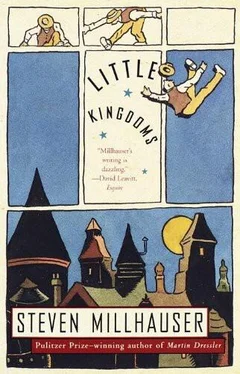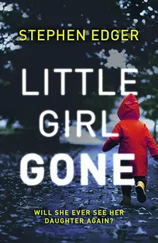The reviews in the film trade journals were lengthy and laudatory, though several critics complained that the deliberate rejection of studio techniques, the elaborate detail, the painstaking finish, set the cartoon so radically apart from its contemporary rivals that it existed in a world by itself and could exert no influence. One critic, attempting to define its baffling quality, said that it was at once daring and old-fashioned, casting one eye boldly toward a realm of animation that had not yet come into being and the other eye back to the comfort and stability of a vanished past. “I wonder what sort of eyeglasses he’d recommend,” Franklin remarked, while Max reported that the overall marketing strategy he’d discussed with Cinemart and the jazzy promotional posters in particular had been so successful, so very successful, that other studios were already beginning to copy them and the head of Cinemart had paid him a personal compliment.
On Wednesday morning, four days after he had sat in the darkening movie theater and seen shadowy lines between Cora’s eyebrows, Franklin was asked to report to the office of Alfred Kroll. As he walked down the darkening corridor toward the dingy door whose glass pane was covered by perpetually closed Venetian blinds, he wondered vaguely what possible cause for complaint Kroll might have against Toys at Midnight , if indeed that was the reason for the unusual summons; for although the cartoon bore Franklin’s name, it was an entirely original creation that made no use of any comic strip and could in no way injure the World Citizen. His relations with Kroll had been coolly cordial since the summons three years ago, for Kroll practiced among all his employees a kind of cryptic amiability, and as Franklin pushed open the rattling door and stepped into the twilight of the reception room he had the sudden sense that no time ever passed in this realm of gloom, with its tarnished floor lamp and its faded, barely visible secretary.
In his dim-lit office Kroll sat immobile behind his desk, looking out from melancholy and intelligent eyes above their dark pouches. Franklin, as he sat down across from him, had the sensation that Kroll had been deftly sketched by a cunning hand: the large head boldly indicated by three or four strokes, the powerful plump body roughly outlined, here and there a few skillful shadings. His large, soft hands lay folded on the desk before him. Without moving, Kroll spoke.
In no way, he said, did he wish to meddle in the private affairs of his employees, except, to be sure, when those private affairs affected the fortunes of the World Citizen. For some time he had sensed a — what should he say? — a slight falling off, a lack of verve, a loss of passion or energy in Mr. Paynes editorial cartoons. He had not known whether to attribute this puzzling deficiency to general fatigue, to overzealousness in the performance of his other newspaper duties, to a failure to engage imaginatively with the crucial issues of the day, or to some other cause. It had now come to his attention that Mr. Payne had been engaging in an activity that in no way concerned the World Citizen —an activity that, however admirable it undoubtedly was in itself, was bound to consume considerable time and energy. He had no wish to go into the matter, which he had had the pleasure of discussing with Mr. Payne on another occasion. He did however wish to insist, indeed he was incapable of not insisting, that workers in the employ of the World Citizen devote their full energy to the business of the World Citizen and refrain from any activities that might detract from or diminish that energy. In a word, he was forced to order Mr. Payne to cease immediately to occupy himself with animated films, on pain of severing his happy association with the World Citizen. In addition, he was taking it upon himself to cancel two of Mr. Payne’s three comic strips so that he might devote himself with full energy to the editorial cartoons for which in the past he had demonstrated so great an aptitude. If there were no questions, he wished Mr. Payne a good morning.
The cool brashness of it impressed Franklin, even as the gray meaning of it, like an exhalation of Kroll’s gloomy cave, came over him in a thickening drizzly fog. The sense of clouds and chill was still with him at lunch the next day in the arcade building, where he told Max that he felt as if his hands had been cut off at the wrists. Max, saying that he’d recently thrown out a rotten eggplant that looked better than Kroll, leaned forward and spoke in a low voice.
“I have news, Franklin: big news. It’s not official yet, so your lips are sealed, but listen to me now. I’m leaving Vivograph next week. I’ve got the office space lined up two blocks away and all the guys are coming with me. I’m calling it Maxograms, Inc. — don’t laugh. It’s a surefire thing. In a week I’ll be a corporation. I’m sick of working for clowns like Kroll, and so are you. Franklin, listen to me. Tell fatso you’re kissing the old dump goodbye. Tell him thanks for the buggy ride but it’s time you rode your own jalopy. Franklin: listen. Come to work at Maxograms. I’ll give you the freedom you need to do the work you want to do and I’ll put my staff at your disposal — inkers, in-betweeners, all the little guys who can take care of the dreck while you take care of the art. Franklin: forget Kroll. You need him like a hole in the head. He’s nothing but a five-and-dime Buddha. Ask yourself what you’d rather do with your life: have free run of Maxograms and do what you want to do, or spend the rest of your life drawing funny faces for the likes of Alfred Kroll, who sits there drowning in his own butterfat scribbling trash about the fate of the nation and jiggling his wienie under the desk.”
Franklin told Max he’d think the offer over, but even as he spoke he knew he would say no. At night he lay awake, trying to understand what was wrong with him. To work every day on animated drawings, to be paid for his work as he did it, to have at his disposal the camera, the projection room, the help of skilled assistants, the practical advice of professional animators, to watch his work take shape under an expectant and well-wishing communal gaze, above all to have time: all this was not to be refused lightly. But even as he felt the temptation of it he was aware of an inner recoil. For the flaw was this: even if Max should remain true to his word, and an unlikely freedom should in fact be granted to Franklin within the strictly run studio, his work, for better or worse, had always originated and flourished in secrecy. Whatever Max thought he was offering — perhaps a room of Franklin’s own, with a locked door, at the farthest end of the studio — Franklin knew that Max could never prevent himself from following each day’s work, making suggestions, urging one direction rather than another. For the spirit of a studio was communal, and it was precisely this public and open spirit, which in one sense was a temptation, that in another was sheer death to the solitary, secretive, perhaps unhealthy, but utterly necessary spirit in which he did his work. There was one more thing. Kroll might be harsh, Kroll might be pompous and cold, Kroll might enjoy exercising power to the point of tyranny, but he wasn’t corrupt, he wasn’t self-serving, and he was in no sense a fool. His passion was not for himself but for the World Citizen , and his fanatical demand for total devotion to the paper was not in itself ignoble. And Kroll’s instinct, when all was said and done, had been entirely right: Franklin had in fact been slacking off, even the comic strips no longer engaged his deepest interest, his passion lay elsewhere. Kroll’s decision had been ruthless, but not unreasonable — or if it had been unreasonable, it had at any rate been understandable. Kroll’s fanaticism ran deeper than Max’s; in some black corner of Franklin’s brain, he felt an odd kinship with Kroll, even as he raged at his punishment.
Читать дальше












